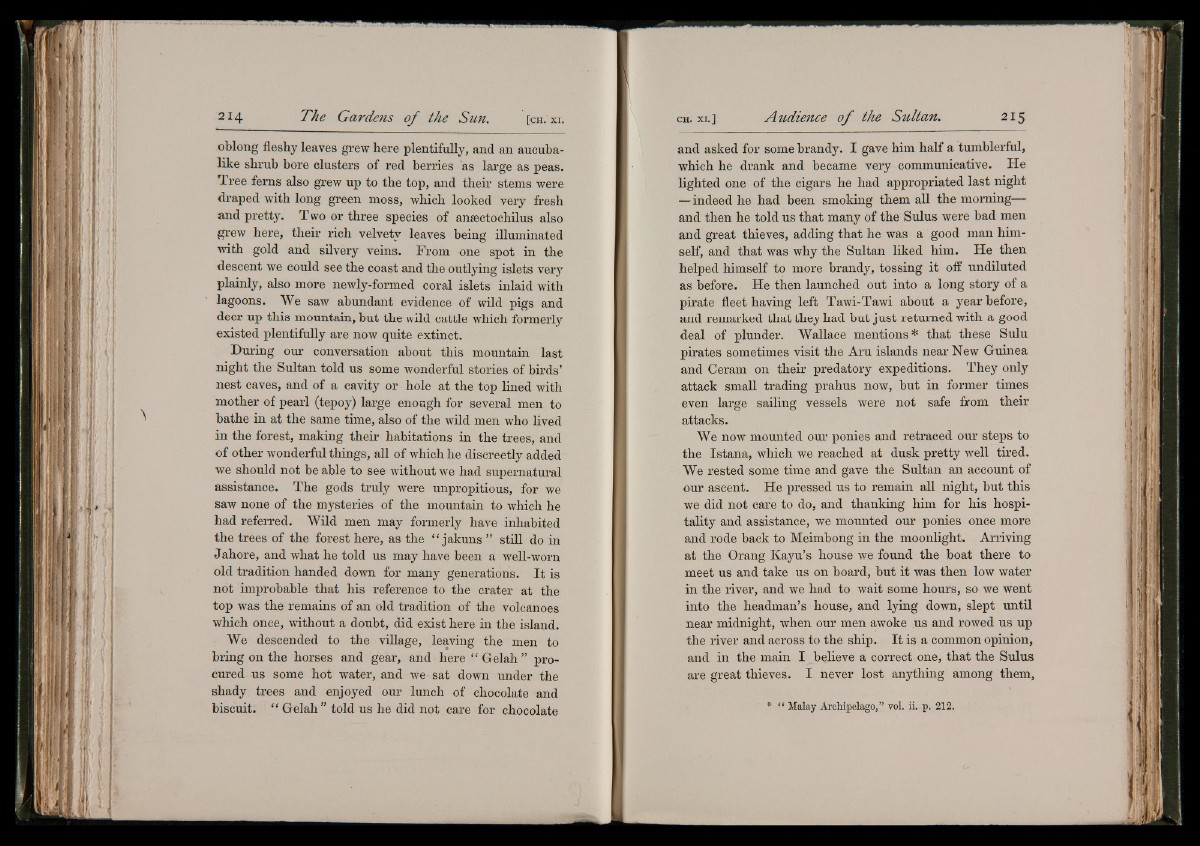
oblong fleshy leaves grew here plentifully, and an aucuba-
like shrub bore clusters of red berries as large as peas.
Tree ferns also grew up to the top, and their stems were
draped with long green moss, which looked very fresh
and pretty. Two or three species of ansectochilus also
grew here, their rich velvety leaves being illuminated
with gold and silvery veins. From one spot in the
descent we could see the coast and the outlying islets very
plainly, also more newly-formed coral islets inlaid with
lagoons. We saw abundant evidence of wild pigs and
deer up this mountain, but the wild cattle which formerly
existed plentifully are now quite extinct.
During our conversation about this mountain last
night the Sultan told us some wonderful stories of birds’
nest caves, and of a cavity or hole at the top lined with
mother of pearl (tepoy) large enough for several men to
bathe in at the same time, also of the wild men who lived
in the forest, making their habitations in the trees, and
of other wonderful things, all of which he discreetly added
we should not be able to see without we had supernatural
assistance. The gods truly were unpropitious, for we
saw none of the mysteries of the mountain to which he
had referred. Wild men may formerly have inhabited
the trees of the forest here, as the “ jakuns ” still do in
Jahore, and what he told us may have been a well-worn
old tradition handed down for many generations. It is
not improbable that his reference to the crater at the
top was the remains of an old tradition of the volcanoes
which once, without a doubt, did exist here in the island.
We descended to the village, leaving the men to
bring on the horses and gear, and here “ Gelah ” procured
us some hot water, and we sat down under the
shady trees and enjoyed our lunch of chocolate and
biscuit. “ Gelah ” told us he did not care for chocolate
and asked for some brandy. I gave him half a tumblerful,
which he drank and became very communicative. He
lighted one of the cigars he had appropriated last night
— indeed he had been smoking them all the morning—
and then he told us that many of the Sulus were bad men
and great thieves, adding that he was a good man himself,
and that was why the Sultan liked him. He then
helped himself to more brandy, tossing it off undiluted
as before. He then launched out into a long story of a
pirate fleet having left Tawi-Tawi about a year before,
and remarked that they had but just returned with a good
deal of plunder. Wallace mentions* that these Sulu
pirates sometimes visit the Aru islands near New Guinea
and Ceram on their predatory expeditions. They only
attack small trading prahus now, but in former times
even large sailing vessels were not safe from their
attacks.
We now mounted our ponies and retraced our steps to
the Istana, which we reached at dusk pretty well tired.
We rested some time and gave the Sultan an account of
our ascent. He pressed us to remain all night, but this
we did not care to do, and thanking him for his hospitality
and assistance, we mounted our ponies once more
and rode back to Meimbong in the moonlight. Arriving
at the Orang Kayu’s house we found the boat there to
meet us and take us on board, but it was then low water
in the river, and we had to wait some hours, so we went
into the headman’s house, and lying down, slept until
near midnight, when our men awoke us and rowed us up
the river and across to the ship. It is a common opinion,
and in the main I believe a correct one, that the Sulus
are great thieves. I never lost anything among them,
* “ Malay Archipelago,” vol. ii. p. 212.